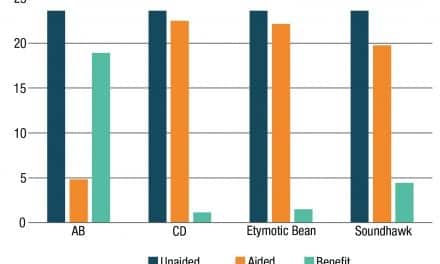The International Hearing Society (IHS) has provided a set of guidelines for when/how often individuals should check their hearing.
Approximately 48 million Americans have some degree of hearing loss and most of those people wait an average of four to five years before seeking help. Proactive hearing checks and interventions, when appropriate, may help reduce one’s risk of dementia and cognitive decline, and provide other benefits.
The International Hearing Society (IHS) offered these guidelines to help Americans address their hearing issues:
- People should get their hearing tested at least every three years.
- People regularly exposed to noise should have an annual hearing test.
- People who notice a change in their hearing or develop tinnitus should have their hearing checked as soon as possible.
- Current hearing aid wearers should have an annual hearing test.
IHS is a proud promoter of hearing healthcare awareness during May (Better Hearing and Speech Month) and all year round. IHS Executive Director Alissa Parady had her hearing checked in May and shared what you can expect during a typical hearing health visit.
“The office staff was so welcoming. After completing a short questionnaire, I was introduced to the hearing aid specialist. We spoke about my health history and hearing challenges, he checked my ears, and then he conducted a hearing evaluation, which took about 20 minutes,” said Parady. “After the hearing test, my hearing aid specialist discussed the results with me and next steps. These next steps are specific to the individual – for some hearing aids might be the right solution, and the professional can discuss options that align with your needs; for others it might be a referral or a recommendation to come back in a year to get rechecked. Either way, getting your hearing baseline is vital for measuring against your future hearing tests.”
Currently, only 1 in 5 people who would benefit from a hearing aid actually uses one. However, as acceptance of ear-worn devices is increasing, people should feel more comfortable about their use. Additionally, an estimated 50 million Americans experience tinnitus (ringing in the ears) and 90% of those individuals also experience hearing loss.
“Taking care of your hearing is necessary for your overall health,” said Parady. “Not only is untreated hearing loss proven to increase one’s risk of dementia, but research also shows that the use of hearing aids by those who can benefit from them actually decreases their risk. The use of professionally fit hearing aids can also help with safety and energy levels, contribute to positive relationships, and affect well-being.”
A successful hearing test begins by making an appointment with a qualified hearing healthcare provider. If you don’t have one, individuals can access IHS’ convenient member directory to locate a local hearing aid specialist.
Take steps today to protect your hearing and promote hearing health by visiting a hearing healthcare professional near you. You can also ‘step’ into action by supporting or walking in a local Hearing Loss Association of America’s (HLAA) Walk4Hearing campaign, which raises money to support people with hearing loss. Team IHS has plans to join the Michigan Walk4Hearing on May 20, 2023, at Kensington Metro Park. Individuals may join IHS or find a local walk by visiting Walk4Hearing – Hearing Loss Association of America.
Photo 35814814 © Katarzyna Bialasiewicz | Dreamstime.com





